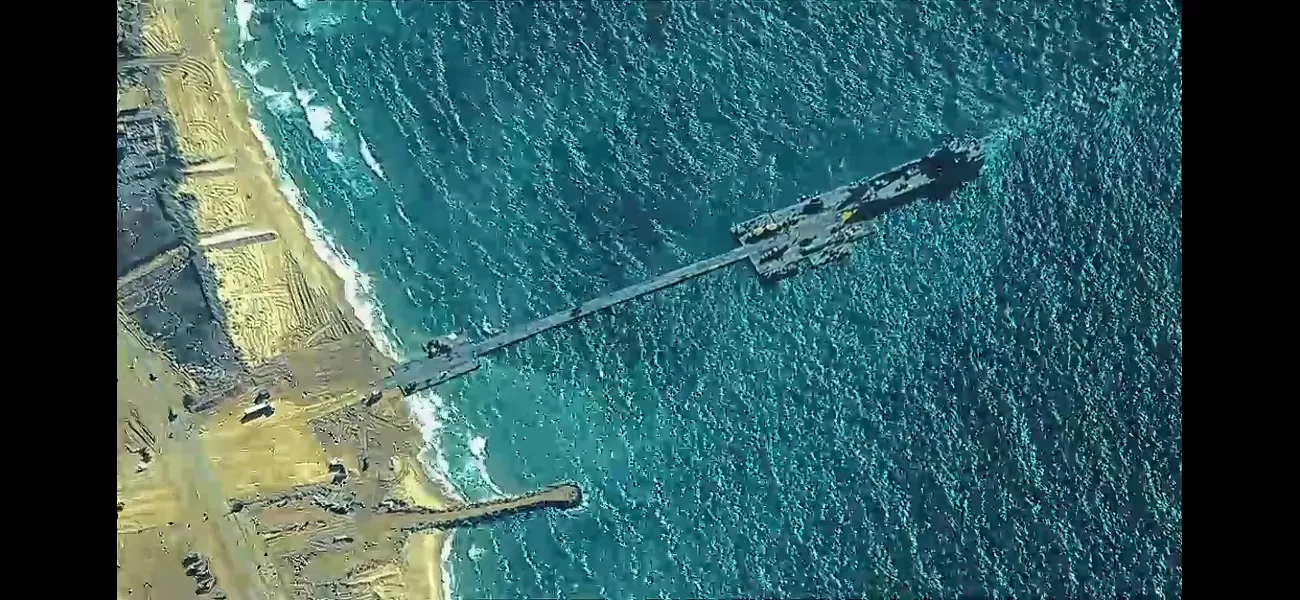Learn about the US-built pier in Gaza and its potential impact in aiding Palestinians.
A pier has been constructed in the U.S. to deliver humanitarian aid to Gaza via water.
May 17th 2024.

In Washington, there is a newly built pier that is intended to bring much-needed humanitarian aid to Gaza by sea. However, its effectiveness remains to be seen as it will only be tested once a steady flow of aid reaches the starving Palestinians.
The trucks that will be unloaded from the pier, which was completed on Thursday, will face numerous challenges. There is ongoing conflict in the region, with threats from Hamas to target any foreign forces, and uncertainty about whether the Israeli military will guarantee safe access for aid convoys and protect them from potential attacks.
Even if the sea route proves successful, it is important to note that it will only provide a small fraction of the aid that Gaza desperately needs. Aid officials from the United States, United Nations, and other organizations have consistently emphasized that Gaza requires over 500 truckloads of aid per day, but the current average is only around 90.
Since Hamas launched an attack on Israel in October, the country has restricted the entry of food, fuel, and other supplies through land crossings. This, combined with the ongoing fighting, has created a dire humanitarian situation for the people of Gaza. According to experts, all 2.3 million residents are experiencing acute food insecurity, with 1.1 million facing "catastrophic" levels of hunger. USAID and U.N. officials have even warned of famine in certain areas.
In order to save the lives of those most affected, it is crucial to establish a cease-fire and provide consistent medical treatment. At full capacity, the sea route is only expected to reach around 500,000 people, which is just over one-fifth of the population.
As the aid is brought in, the plan is for the United Nations to take charge and then hand it over to various aid groups for distribution. However, there are concerns about maintaining neutrality, especially with the involvement of the Israeli military in the sea route. Negotiations are ongoing to address this issue.
Furthermore, there are still uncertainties surrounding the safety of aid workers as they operate in Gaza. According to Sonali Korde, a USAID official, there have been no significant improvements in the protection of aid workers since a deadly attack in April. Talks with the Israeli military are ongoing to ensure the safety and security of humanitarian workers.
Meanwhile, the conflict in Gaza continues to escalate. While the new shoreline aid distribution area is not currently under threat, the U.S. has warned that security conditions could lead to a temporary shutdown of the sea route. To prevent this, the U.S. and Israel have developed a security plan for humanitarian groups, but it is ultimately up to each aid organization to follow their own security protocols.
In addition, the Israeli military has taken control of the border crossing in Rafah, preventing the delivery of aid, including much-needed fuel. Without fuel, aid cannot be distributed throughout Gaza, creating an even more dire situation for its residents.
In light of these challenges, U.S. President Joe Biden's administration, the U.N., and aid groups are urging Israel to allow more aid through the land crossings and to actively coordinate with aid groups to prevent attacks on humanitarian workers. They stress that the newly built pier is only a partial solution and that more must be done to ease the suffering of the people of Gaza.
Israel, on the other hand, claims that it does not limit the entry of humanitarian aid and blames the U.N. for delays in distributing goods. However, the U.N. cites ongoing conflict and Israeli fire as the main obstacles to delivering aid.
In the end, it is clear that the sea route alone cannot solve the crisis in Gaza. Immediate action is needed from all parties involved to ensure the safe and efficient delivery of aid to those who need it most. As U.N. spokesman Farhan Haq stated, "To stave off the horrors of famine, we must use the fastest and most obvious route to reach the people of Gaza - and for that, we need access by land now."
The trucks that will be unloaded from the pier, which was completed on Thursday, will face numerous challenges. There is ongoing conflict in the region, with threats from Hamas to target any foreign forces, and uncertainty about whether the Israeli military will guarantee safe access for aid convoys and protect them from potential attacks.
Even if the sea route proves successful, it is important to note that it will only provide a small fraction of the aid that Gaza desperately needs. Aid officials from the United States, United Nations, and other organizations have consistently emphasized that Gaza requires over 500 truckloads of aid per day, but the current average is only around 90.
Since Hamas launched an attack on Israel in October, the country has restricted the entry of food, fuel, and other supplies through land crossings. This, combined with the ongoing fighting, has created a dire humanitarian situation for the people of Gaza. According to experts, all 2.3 million residents are experiencing acute food insecurity, with 1.1 million facing "catastrophic" levels of hunger. USAID and U.N. officials have even warned of famine in certain areas.
In order to save the lives of those most affected, it is crucial to establish a cease-fire and provide consistent medical treatment. At full capacity, the sea route is only expected to reach around 500,000 people, which is just over one-fifth of the population.
As the aid is brought in, the plan is for the United Nations to take charge and then hand it over to various aid groups for distribution. However, there are concerns about maintaining neutrality, especially with the involvement of the Israeli military in the sea route. Negotiations are ongoing to address this issue.
Furthermore, there are still uncertainties surrounding the safety of aid workers as they operate in Gaza. According to Sonali Korde, a USAID official, there have been no significant improvements in the protection of aid workers since a deadly attack in April. Talks with the Israeli military are ongoing to ensure the safety and security of humanitarian workers.
Meanwhile, the conflict in Gaza continues to escalate. While the new shoreline aid distribution area is not currently under threat, the U.S. has warned that security conditions could lead to a temporary shutdown of the sea route. To prevent this, the U.S. and Israel have developed a security plan for humanitarian groups, but it is ultimately up to each aid organization to follow their own security protocols.
In addition, the Israeli military has taken control of the border crossing in Rafah, preventing the delivery of aid, including much-needed fuel. Without fuel, aid cannot be distributed throughout Gaza, creating an even more dire situation for its residents.
In light of these challenges, U.S. President Joe Biden's administration, the U.N., and aid groups are urging Israel to allow more aid through the land crossings and to actively coordinate with aid groups to prevent attacks on humanitarian workers. They stress that the newly built pier is only a partial solution and that more must be done to ease the suffering of the people of Gaza.
Israel, on the other hand, claims that it does not limit the entry of humanitarian aid and blames the U.N. for delays in distributing goods. However, the U.N. cites ongoing conflict and Israeli fire as the main obstacles to delivering aid.
In the end, it is clear that the sea route alone cannot solve the crisis in Gaza. Immediate action is needed from all parties involved to ensure the safe and efficient delivery of aid to those who need it most. As U.N. spokesman Farhan Haq stated, "To stave off the horrors of famine, we must use the fastest and most obvious route to reach the people of Gaza - and for that, we need access by land now."
[This article has been trending online recently and has been generated with AI. Your feed is customized.]
[Generative AI is experimental.]
0
0
Submit Comment





